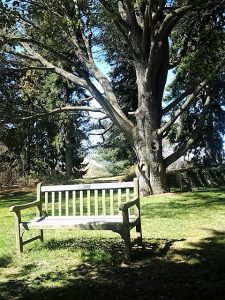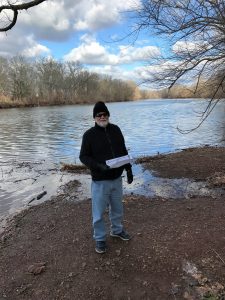 You have searched me, Lord, and you know me. You know when I sit and when I rise; you perceive my thoughts from afar. You discern my going out and my lying down; you are familiar with all my ways. Before a word is on my tongue you, Lord, know it completely. You hem me in behind and before, and you lay your hand upon me. Such knowledge is too wonderful for me, too lofty for me to attain (Psalm 139:1-6 NIV).
You have searched me, Lord, and you know me. You know when I sit and when I rise; you perceive my thoughts from afar. You discern my going out and my lying down; you are familiar with all my ways. Before a word is on my tongue you, Lord, know it completely. You hem me in behind and before, and you lay your hand upon me. Such knowledge is too wonderful for me, too lofty for me to attain (Psalm 139:1-6 NIV).
Each of the “omni” attributes can be very unsettling to humans, and it is good to be disturbed, if this disruption leads us to draw near to God and to worship and trust him. God’s omniscience means that the Lord knows everything. He knows all that has happened, is happening, and will ever happen (Genesis 15:13-16; Isaiah 42:9; Daniel 2:22; Matthew 6:8) in the whole universe. God knows what could happen, though it does not (Genesis 20:6). God does not acquire knowledge; he does not need to be taught; in fact, he cannot learn because he already knows. Such knowledge is far beyond human experience, since we know so little and are always learning new information.
The classic passage setting forth God’s omniscience is Psalm 139:1-6, but God tells us that he is all knowing in many ways (1 Samuel 2:3). God has perfect knowledge (Job 37:16; Romans 11:33; Hebrews 4:13), and it is beyond our feeble understanding (Isaiah 40:28). God knows the hearts (inner personal beings) of all people (1 Samuel 16:7; 1 Kings 8:39; 2 Chronicles 16:9; Psalm 7:9; 94:11; Proverbs 15:11; Jeremiah 17:10; Ezekiel 11:5; Acts 1:24; 1 John 3:19-20; Revelation 2:23). He knows where we are (2 Kings 19:27; Job 23:10), what we do (Psalm 33:13-15; Proverbs 5:21; 15:3; Hosea 7:2), how we suffer (Exodus 3:7), and what we desire (Psalm 38:9). He fully understands what we do in secret (Psalm 90:8; Matthew 6:4, 18). He knows all about his creation (Matthew 6:8, 32; 10:29-30), including all that is beyond our discovery (Psalm 147:4-5). God’s has perfect knowledge of future events and so he can perfectly predict what will happen (Isaiah 44:7-8, 24-28). This all-knowledge is clearly related to God’s sovereign purpose (Isaiah 46:9-11)
“Neither the darkness of night, the closest curtains, nor the deepest dungeon can hide any sinner from the eyes of Omniscience. The trees of the garden were not able to conceal our first parents. No human eye beheld Cain murder his brother, but His Maker witnessed his crime. Sarah might laugh derisively in the seclusion of her tent, yet it was heard by Jehovah. Achan stole a wedge of gold and carefully hid it in the earth, but God brought it to light. David was at much pains to cover up his wickedness, but ere long the all-seeing God sent one of His servants to say to him, ‘Thou are the man!’ And to writer and reader is also said, ‘Be sure your sin will find you out’ (Numbers 32:23)” (Pink, Attributes of God, p. 14]
What about prayer? Should we pray if God knows everything? What reason do we have for prayer, if we are not informing God of our needs? To ask such questions is to misunderstand the nature of prayer. True prayer is a believer’s communication with God (Psalm 54:2; etc.). In prayer, we do not inform God, but we do express our needs and desires to him. Prayer is not an attempt to change the mind of the Omniscient One, but it is a true means through which God works his purposes. In fact, “here is an encouragement to prayer. There is no cause for fearing that the petitions of the righteous will not be heard, or that their sighs and tears shall escape the notice of God since He knows the thoughts and intents of the heart. There is no danger of the individual saint being overlooked amidst the multitude of supplicants who daily and hourly present their various petitions, for an infinite Mind is as capable of paying the same attention to millions as if only one individual were seeking its attention” (Pink, p. 15).
At this point, we should say something about God’s foreknowledge. This word occurs only five times in reference to God (Acts 2:23; Romans 8:29; 11:2; 1 Peter 1:2, 20). In each case, it does not mean simple foresight, but it expresses the love or purpose of God in choosing his people or planning the work of salvation in Christ.
The doctrine of God’s knowledge should produce reasons for joy in God’s people (Boice, The Sovereign God, pp. 178-182, his emphasis).
- “First, because God knows all things, he knows the worst about us and yet he has loved and saved us…”
- “Second… he also knows the best about us, even though that best may be unknown to any other person.”
- “Third, God knows what he is going to make of us…”
- “Finally, we can be encouraged in difficulties… All that is needed is that we take these truths down off the high shelf of theology and put them to work as we live our daily lives.”
Grace and peace, David

 Genesis 45:4-15
Genesis 45:4-15 Genesis 43:1-14
Genesis 43:1-14 Romans 15:13
Romans 15:13 Romans 15:13
Romans 15:13

 Psalm 25:16-22
Psalm 25:16-22 Psalm 25:1-3
Psalm 25:1-3 2 Timothy 1:13
2 Timothy 1:13